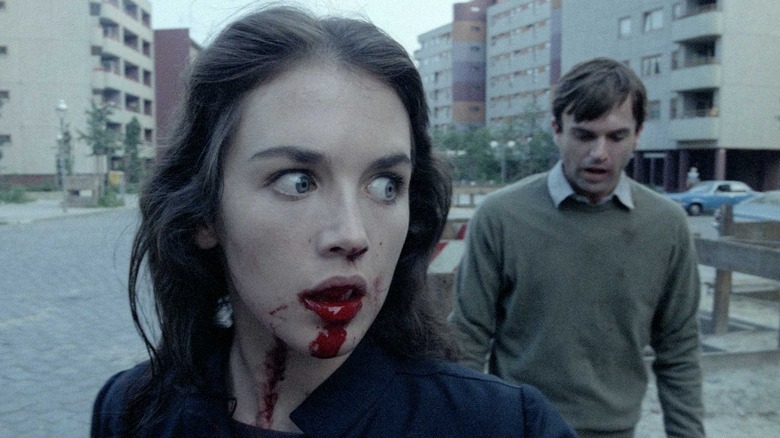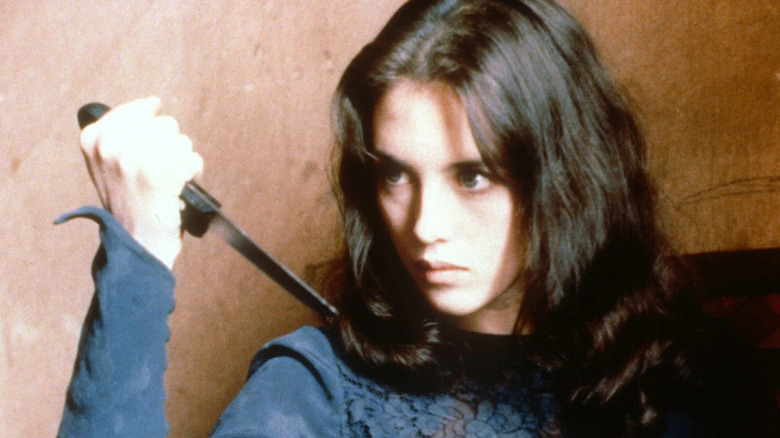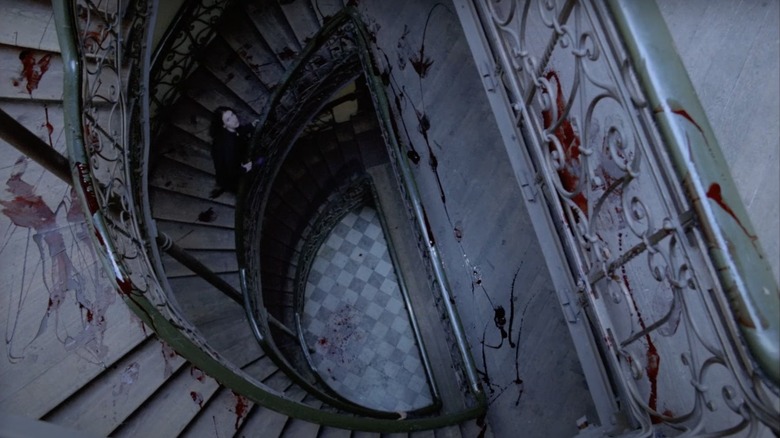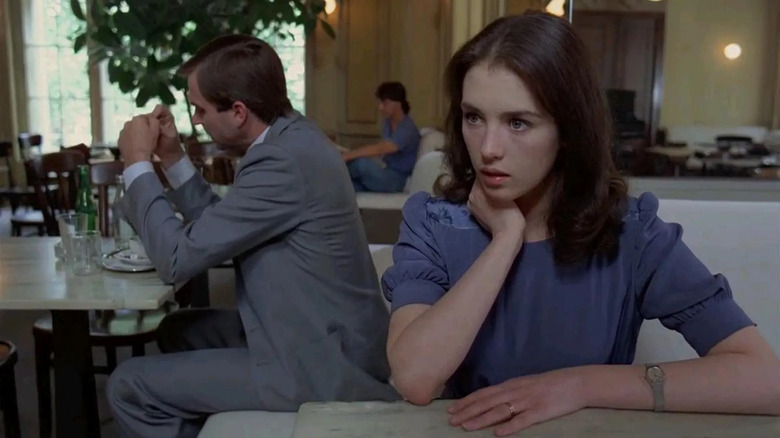Why It Took Decades For Possession To Become A Horror Classic
One of the most profoundly disturbing films to tackle the theme of marital loneliness, Polish director Andrzej Żuławski's "Possession" has become a veritable cult classic since its initial release in 1981. While it's a masterclass in directorial finesse and full-body acting, so much of what has fueled the film's cult status has been its comparative cinematic obscurity. Effectively banned in the UK upon its release, coming across a copy of "Possession" seemed all but impossible for casual viewers for decades. When cinephiles were lucky enough to come across a copy, it was typically a heavily edited 81-minute cut as opposed to the 124-minute version that originally premiered at Cannes.
Although the intricacies of the film's plot are best experienced totally unspoiled, a brief synopsis is nonetheless warranted. When Mark (played by an early-career Sam Neill) returns to his Berlin home from a secret espionage mission, he finds that his wife, Anna (Isabelle Adjani), is suddenly demanding a divorce. Heartbroken and dumbfounded, Mark begins to uncover the increasingly disturbing reasons behind Anna's decision. She begins to neglect their son, Bob, leaving him alone unattended for long stretches of time while she's romancing with her new lover, Heinrich. After a while, Mark begins covertly following her around, realizing she spends most of her free time in a run-down, abandoned apartment building. What he finds enclosed within the mold-splotched walls defies scientific explanation, and it effectively ramps up the horror plot inherent to "Possession."
When the film finally hit UK theaters nearly a year after its Cannes premiere, it was immediately deemed unfit for public consumption. Yet the film's reputation as a demented descent into madness has kept viewers hooked on the prospect of coming across a copy. Luckily, Metrograph's recent 4K restoration has made this once unlikely dream into a tangible reality — take that, censors.
When so many so-called "video nasties" (aside from a lucky few) have fallen into obscurity, what's kept "Possession" so enticing over 40 years later? We're here to delve into just that.
Initial acclaim at Cannes
While "Possession" might be largely relegated to the (albeit fun) realm of horror "cult classic," it was in competition for the prestigious Palme d'Or at the 1981 edition of the Cannes Film Festival. While the prize was ultimately granted to fellow Polish filmmaker Andrzej Wajda's "Man of Iron," "Possession" left the festival far from empty-handed. Lead actress Isabelle Adjani won the Best Actress award (which was concurrently granted to Adjani for her role in the Merchant Ivory film "Quartet"), and it's easy to see why. Her completely unhinged, manic performance is a key factor behind the film's success. At the very least, a specific subway scene immediately comes to mind whenever one thinks back on the scariest scenes in the film.
In fact, "Possession" and Adjani's performance racked up prizes as it traveled from festival to festival and eventually hit the awards circuit. The same year, it won the Film Critics Prize at São Paulo International Film Festival. In 1983, the director was granted the Special Audience Jury Prize, while Adjani once again was bestowed Best Actress at Portugal's Fantasporto. Her performance hit the peak of French national acclaim when she won Best Actress at the 1982 Cesar Awards (after all, the film was a co-production between France and Germany), which is essentially France's equivalent of the Academy Awards.
Clearly, though, the critical praise directed at "Possession" was nowhere near enough to defy the pearl-clutching tendencies of the National Viewers' and Listeners' Association in Britain during the 1980s.
Video nasty classification
During the widespread conservative moral panic of the '80s, defined by Prime Minister Margaret Thatcher in the UK, a ton of horror and exploitation films were subject to censorship. Colloquially dubbed "video nasties," the films were said to portray violence and gore so senseless it could potentially traumatize young viewers. Much of the term refers to the distribution of such films on tape as opposed to in theaters, but made acquiring such titles after their theatrical run incredibly difficult. Of course, brandishing a film as a "video nasty" also gave the films a mystifying power. Curious viewers would intentionally seek out "banned" titles such as Sam Raimi's "The Evil Dead," Wes Craven's "The Last House on the Left," Meir Zarchi's "I Spit on Your Grave," and Ruggero Deodato's infamous "Cannibal Holocaust." Unfortunately, Andrzej Żuławski's "Possession" would never reach the same level of sought-after notoriety, namely because even in the U.S. the film was never released in its full, 124-minute glory.
For some reason, when the film was finally released on U.S. screens, distributor Limelight International Films opted to release an 81-minute cut of the film, meaning that a third of "Possession" was effectively missing. As opposed to removing excessive violence or disturbing imagery, though, the edit served to market it solely as a horror film. This meant all the intense scenes of marital strife were nixed in favor of promoting a more straightforward creature feature. The few critics who managed to catch a screening of the heavily tailored release totally panned it — an understandable backlash considering how far it strayed from Żuławski's original vision.
With no comprehensive home release for "Possession" available in the U.S. or the U.K., the film became a white whale for many horror aficionados. After all, Italian special effects artist Carlo Rambaldi (who worked on "Alien" and "E.T.") was involved in creating the film, so something impressive and outright horrifying is all but guaranteed. However, with its lack of the intense build-up of mutual marital disintegration included in the plot, the gimmicky 1983 Limelight release just didn't scratch the itch.
Recent restoration and renewed intrigue
Thankfully, "Possession" has become much easier to, well, possess as time has passed. Despite its censorship in the UK, the film was released uncut on DVD and VHS by American production company Anchor Bay Entertainment in 2000. The film then became available on Blu-ray in 2014, when Mondo Vision issued a standard special edition of which only 2,000 copies were made available. Clearly, as the film became more accessible and was able to reach a larger audience, its status as an impressive, chaotic force of a film was incrementally solidified. As such, screenings of the still-comparatively rare film would draw large audiences, including a twisted programming slot by Anthology Film Archives in New York City, which would play the film annually on Valentine's Day to a horrified audience of lovers.
Most recently, Metrograph released a 4K restoration to honor the film's 40th anniversary. It premiered in its newfound glory at Fantastic Fest in 2021 before expanding to theaters across the country in October, perfect for an intense Halloween viewing session. But don't let the spooky season dominate as the one and only time to sit down and play horror classic catch-up. There's something about the romantic spring air that begs for a disquieting love affair — perhaps even involving a sexy suitor with tentacled extremities.
"Possession" is also now available to stream on Metrograph at Home.



